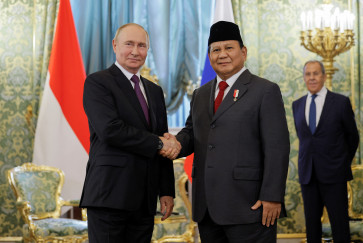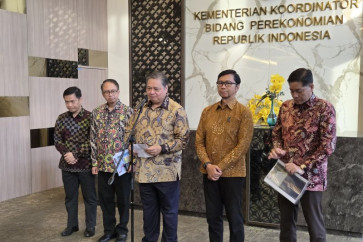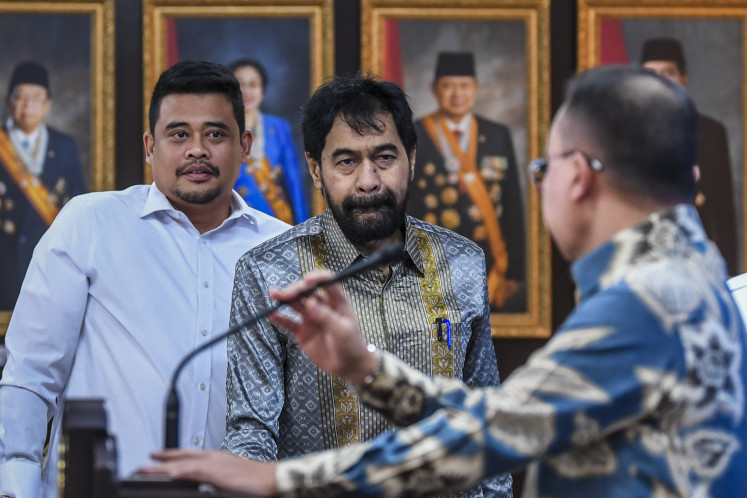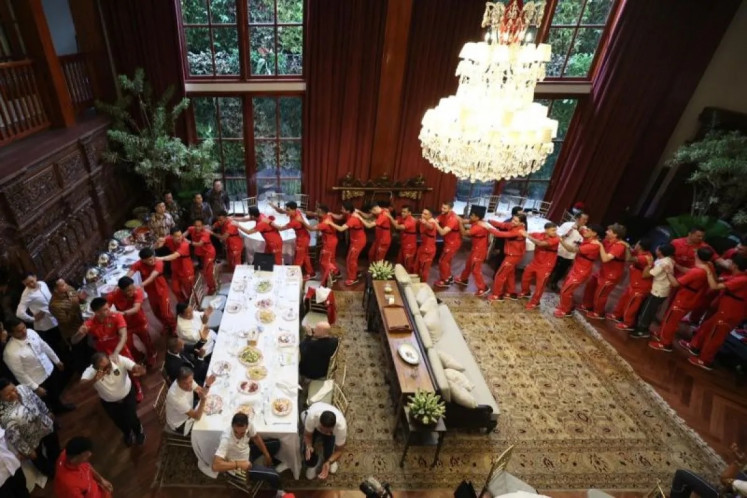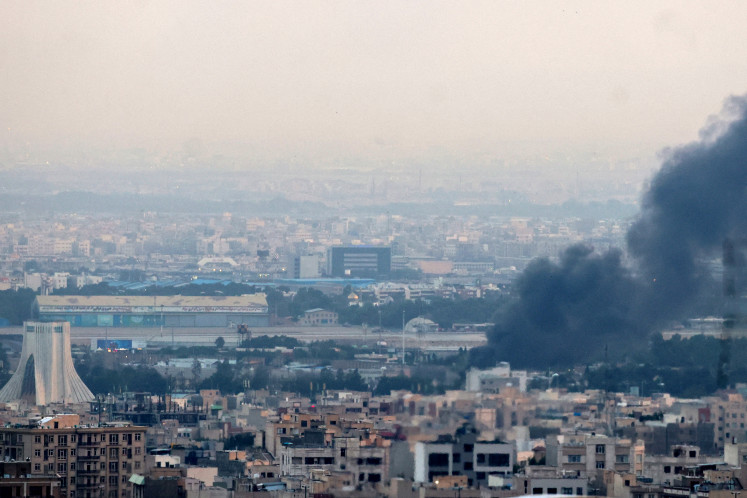Popular Reads
Top Results
Can't find what you're looking for?
View all search resultsPopular Reads
Top Results
Can't find what you're looking for?
View all search resultsIndonesia, Australia resume patrols after fishing row mix-up
Reports of the ship-sinking incident prompted fisheries authorities to suspend joint maritime patrols before the issue was put to rest.
Change text size
Gift Premium Articles
to Anyone
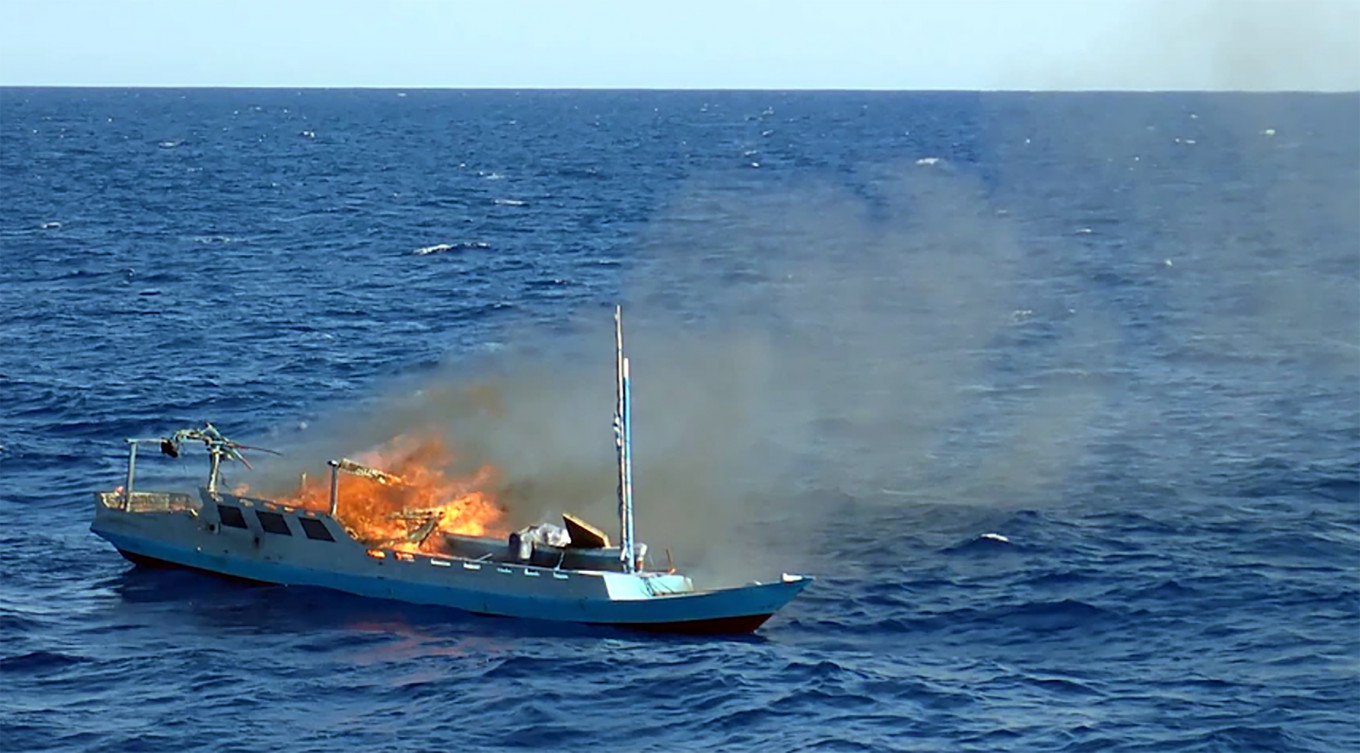
I
ndonesia on Thursday resumed the Jawline-Arafura joint maritime patrols with Australia after clearing up what appeared to be a mix-up of information on the interception and sinking of Indonesian fishing vessels allegedly caught poaching off the northern coast of Western Australia.
Reports of the incident stirred fresh debate between the neighbors earlier this week, with one Australian maritime official accusing Jakarta of failing to provide for its fishermen, which in turn prompted them to stray into Australian waters to fish.
Both sides have since sorted out the misinformation with regard to the incident and resumed their joint patrols.
The Maritime Affairs and Fisheries Ministry’s director general for marine resources and fisheries surveillance (PSDKP), Rear Adm. Adin Nurawaluddin, said in a statement on Thursday that the ministry had dispatched its Orca-03 fisheries vessel and airborne surveillance units to take part in the joint operation. He emphasized that both Indonesia and Australia had the same concerns over “escalating cross-border violations” in the fisheries sector.
The confusion began when Australia’s Maritime Border Command (MBC) announced that it had intercepted 16 vessels operating in the Rowley Shoals, about 160 miles off the nearest Australian coast. The authorities proceeded to escort 13 of the boats out of Australian waters and destroyed three others as a deterrence measure.
The MBC statement was published on Monday, just days ahead of the Jakarta leg of Australian Foreign Minister Marise Payne's tour of Southeast Asia. Payne met with Foreign Minister Retno LP Marsudi in the capital on Wednesday to broach a number of bilateral issues.
Knee-jerk reaction
Upon learning about the reports, the fisheries ministry promptly moved to postpone the Jawline-Arafura patrols, with the PSDKP’s Adin saying he held off the operation while awaiting clarification from the Australian side.
He noted that he had only recently been assured in a meeting that Australia would no longer be resorting to such measures. The official said he met with Australian Embassy officials in Jakarta on Nov. 5 to discuss possible collaboration with Australian authorities on border surveillance activities to prevent illegal fishing practices.
It was at that meeting he was informed about the interception incident and the subsequent burning of three vessels, all of which occurred in mid-October.
“They expressed a commitment that in the future they would no longer set fire to the boats like they did before. They even hoped to cooperate with the PSDKP to forestall illegal fishing by Indonesian fishers entering Australian territory,” Adin told The Jakarta Post on Wednesday.
Read also: ‘Awkward’ fisheries intervention clouds Oz minister’s visit
He said that when the MBC released photos of the incident earlier this week, the immediate assumption was that a new incident occurred over the weekend, after the two sides discussed how to empower Indonesian fishermen from East Nusa Tenggara (NTT) so that they would not veer into Australian waters to harvest sea cucumbers.
The ministry also sought information from the local fishing community in Rote, NTT, to confirm that the incident in the photos occurred in October.
“In the end, we must respect their regulations whether we like them or not, just as the PSDKP enforces regulations against illegal fishing vessels from Malaysia, Vietnam and the Philippines,” Adin said.
Specific intervention
A separate statement published by the Australian Border Force on its website on Monday reported that authorities intercepted and burned the Indonesian vessels in October.
The ABF also reported that it had apprehended 85 illegal fishing vessels in its waters throughout the 2020-2021 financial year and destroyed 12 of them, although the flag countries were left unspecified. In May, the force also intercepted 19 Indonesian fishing vessels, three of which were seized and disposed of at sea, it further reported.
The Jawline-Arafura joint maritime patrols are one of two joint operations that the neighbors have set up to counter illegal fishing practices, the other being Operation Gannet, which is usually conducted earlier in the year.
Read also: Stop sinking ships: New minister plans to give illegal vessels to Indonesian fishermen instead
A researcher from Destructive Fishing Watch (DFW) Indonesia, Asrul Setyadi, said that Indonesian fishermen who fish illegally in Australian waters were usually small-scale fishers in search of sea cucumbers and sea snails, which are expensive commodities and are not widely available in Indonesia.
“It is because of such circumstances that we need specific government intervention in order to address the issue,” Asrul said in a statement.
Overshadowed
The mix-up appeared to have had no bearing on Payne’s visit to Jakarta, with the meeting of the foreign ministers proceeding in a business-as-usual manner and without any mention of the incident.
Instead, the two sides discussed a wide range of other bilateral issues. “We discussed the follow-up to our leaders’ meeting in Rome, especially on the green economy and energy transition cooperation. I shared [with Payne] the priorities of Indonesia's G20 presidency. We also committed to continue strengthening COVID-19 cooperation, including on post-pandemic economic recovery,” Retno said on Twitter.
Read also: Indonesia chides Australia as Indo-Pacific tensions rise
Their meeting commenced in the shadow of Australian ambitions to procure nuclear-powered submarines under the recently established tripartite security arrangement with the United States and the United Kingdom. Canberra has previously aspired to mitigate the regional fallout from its surprise announcement of the alliance dubbed AUKUS.
International law expert Hikmahanto Juwana said that Indonesia should have expressed its objection to Australia’s plan to procure the submarines.
“President [Joko “Jokowi” Widodo] already said it will exacerbate the arms race in the region, and we have repeatedly said that we don’t want this to continue breaking ASEAN apart,” he told the Post.


